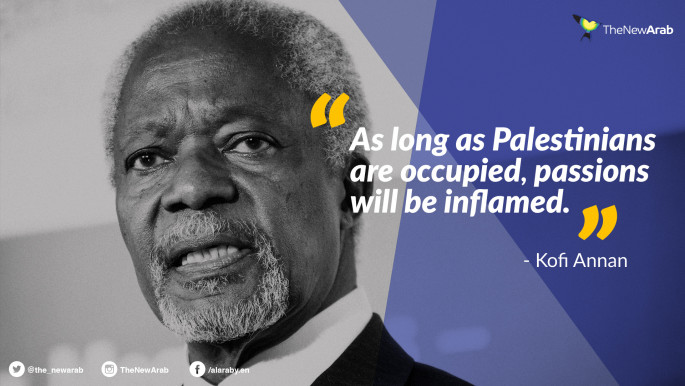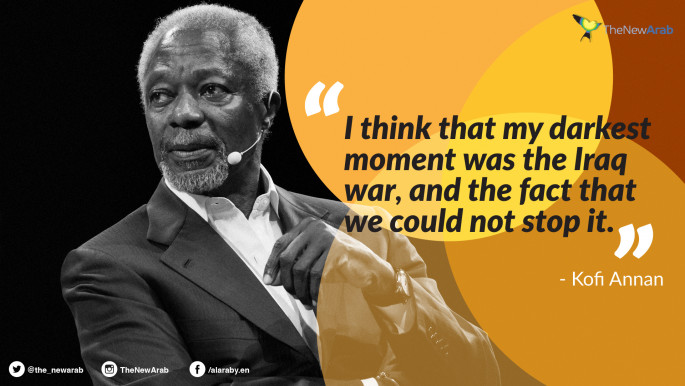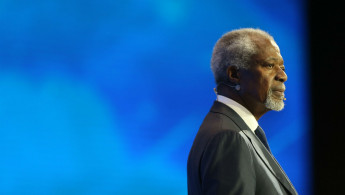Former United Nations secretary-general Kofi Annan dies at 80
Former United Nations secretary-general Kofi Annan, the first black African to rise through the body's ranks to take the top post, has died aged 80.
His foundation announced his death in Switzerland on Saturday in a tweet, saying he died after a short unspecified illness.
"Wherever there was suffering or need, he reached out and touched many people with his deep compassion and empathy," the foundation said.
Annan spent virtually his entire career as an administrator in the United Nations. He served two terms from January 1, 1997, to December 31, 2006, capped nearly mid-way when he and the UN were jointly awarded the Nobel Peace Prize in 2001.
During his tenure, Annan presided over some of the worst failures and scandals at the world body, one of its most turbulent periods since its founding in 1945. Challenges from the outset forced him to spend much of his time struggling to restore its tarnished reputation.
"Kofi Annan was a guiding force for good," current UN Secretary-General Antonio Guterres said. "It is with profound sadness that I learned of his passing. In many ways, Kofi Annan was the United Nations. He rose through the ranks to lead the organisation into the new millennium with matchless dignity and determination."
Annan took on the top UN post six years after the collapse of the Soviet Union and presided during a decade when the world united against terrorism after the Sept. 11 attacks - then divided deeply over the US-led war against Iraq. The US relationship tested him as a world diplomatic leader.
The 'darkest moment'
"I think that my darkest moment was the Iraq war, and the fact that we could not stop it," Annan said in a February 2013 interview with TIME magazine to mark the publication of his memoir, "Interventions: A Life in War and Peace."
"I worked very hard - I was working the phone, talking to leaders around the world. The US did not have the support in the Security Council," Annan recalled in the videotaped interview posted on The Kofi Annan Foundation's website.
"So they decided to go without the council. But I think the council was right in not sanctioning the war," he said. "Could you imagine if the UN had endorsed the war in Iraq, what our reputation would be like? Although at that point, President (George W.) Bush said the UN was headed toward irrelevance, because we had not supported the war. But now we know better."
 |
| [Click to enlarge] |
Despite his well-honed diplomatic skills, Annan was never afraid to speak candidly. That didn't always win him fans, particularly in the case of Bush's administration, with whom Annan's camp spent much time bickering. Much of his second term was spent at odds with the United States, the UN's biggest contributor, as he tried to lean on the nation to pay almost $2 billion in arrears.
He also had special assignments. After Iraq invaded Kuwait in 1990, he facilitated the repatriation from Iraq of more than 900 international staff and other non-Iraqi nationals, and the release of western hostages in Iraq. He led the initial negotiations with Iraq for the sale of oil in exchange for humanitarian relief.
A career in peacekeeping
Just before becoming secretary-general, Annan served as UN peacekeeping chief and as special envoy to the former Yugoslavia, where he oversaw a transition in Bosnia from UN protective forces to NATO-led troops.
The UN peacekeeping operation faced two of its greatest failures during his tenure: the Rwanda genocide in 1994, and the massacre in the Bosnian town of Srebrenica in July 1995.
In both cases, the UN had deployed troops under Annan's command, but they failed to save the lives of the civilians they were mandated to protect. Annan offered apologies, but ignored calls to resign by US Republican lawmakers. After became secretary-general, he called for UN reports on those two debacles - and they were highly critical of his management.
As secretary-general, Annan forged his experiences into a doctrine called the "Responsibility to Protect," that countries accepted - at least in principle - to head off genocide, crimes against humanity, ethnic cleansing and war crimes.
 |
| [Click to enlarge] |
Annan sought to strengthen the UN's management, coherence and accountability, efforts that required huge investments in training and technology, a new whistleblower policy and financial disclosure requirements.
Annan's uncontested election to a second term was unprecedented, reflecting the overwhelming support he enjoyed from both rich and poor countries. Timothy Wirth, president of the United Nations Foundation, which disburses Ted Turner's $1 billion pledge to UN causes, hailed "a saint-like sense about him."
In 2005, Annan succeeded in establishing the Peacebuilding Commission and the Human Rights Council. But that year, the UN was facing almost daily attacks over allegations about corruption in the U.N. oil-for-food program in Iraq, bribery by UN purchasing officials and widespread sex abuse by UN peacekeepers - an issue that would only balloon in importance after he left office.
Before leaving office, Annan helped secure a truce between Israel and Hezbollah in 2006, and mediated a settlement of a dispute between Cameroon and Nigeria over the Bakassi peninsula.
After leaving his high-profile UN perch, Annan didn't let up. In 2007, his Geneva-based foundation was created. That year he helped broker peace in Kenya, where election violence had killed over 1,000 people.
He also joined The Elders, an elite group of former leaders founded by Nelson Mandela, eventually succeeding Desmond Tutu as its chairman after a failed interlude trying to resolve Syria's rising civil war.
As special envoy to Syria in 2012, Annan won international backing for a six-point plan for peace. The UN deployed a 300-member observer force to monitor a cease-fire, but peace never took hold and Annan was unable to surmount the bitter stalemate among Security Council powers. He resigned in frustration seven months into the job, as the civil war raged on.
Annan continued to crisscross the globe. In 2017, his foundation's biggest projects included promotion of fair, peaceful elections; work with Myanmar's government to improve life in troubled Rakhine state; and battling violent extremism by enlisting young people to help.
Annan is survived by his wife and three children. Funeral arrangements weren't immediately announced.





 Follow the Middle East's top stories in English at The New Arab on Google News
Follow the Middle East's top stories in English at The New Arab on Google News


